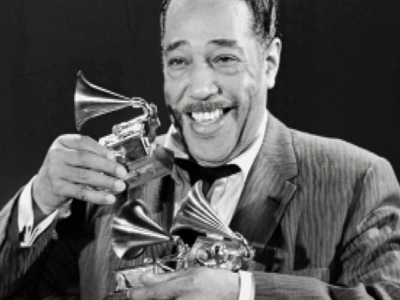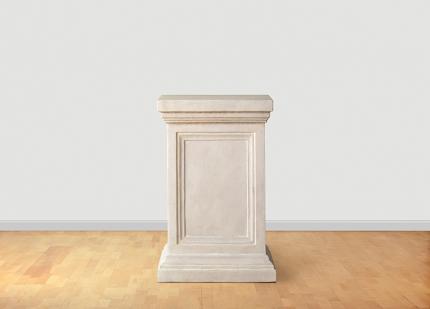 I was surprised–very surprised, if truth be told–when I learned last week that Duke: A Life of Duke Ellington had made the “longlist” (i.e., the list of ten semi-finalists) for the National Book Awards 2013 nonfiction prize. It’s not that I doubt the merits of Duke. The problem is that it’s about art.
I was surprised–very surprised, if truth be told–when I learned last week that Duke: A Life of Duke Ellington had made the “longlist” (i.e., the list of ten semi-finalists) for the National Book Awards 2013 nonfiction prize. It’s not that I doubt the merits of Duke. The problem is that it’s about art.
As I pointed out at the time, Duke was the only art-related title among the ten books on the NBA’s nonfiction longlist. Nor is that unusual. In the past twenty years, just nine NBA nonfiction finalists have been about art in whole or part, and only two, Stephen Greenblatt’s The Swerve (which is not primarily about aesthetic matters) and Patti Smith’s Just Kids, a memoir of her relationship with Robert Mapplethorpe, went on to win the award. No art-related books were tapped as finalists in 1992, 1994, 1995, 1996, 1997, 2001, 2002, 2003, 2006, 2008, or 2011. Moreover, Just Kids and Jacques Barzun’s From Dawn to Decadence, a wide-ranging intellectual history of western culture and its discontents, were the only titles among those nine books that dealt with non-literary art forms. Of the others, two were about Shakespeare, one was a collection of essays by Gore Vidal, one was about a philosophical poem by Lucretius, and the others were biographies of Colette, Ralph Ellison, and Rousseau. All worthy, of course, but it’s as if architecture, classical music and jazz, dance, film and TV, painting, sculpture, and theater after 1616 simply didn’t exist.
I’m not suggesting that the National Book Awards are biased against the arts. I served on the NBA’s panel of nonfiction judges in 2003, after all, and voted enthusiastically with my colleagues to honor a masterly memoir that had nothing whatsoever to do with artistic pursuits. Besides, you’ll find broadly similar results if you take a look at the lists of Pulitzer Prizes in biography and general non-fiction.
What’s in evidence here, I think, is something bigger, something that goes to the heart of our national character. In America you can be thought perfectly well educated without knowing much of anything about the arts. I’m acquainted with any number of board-certified intellectuals whom I doubt would recognize the names of (say) Samuel Barber, Helen Frankenthaler, Frank Loesser, Lynn Nottage, Walker Percy, Preston Sturges, Paul Taylor, or Lester Young. Nor would they blush to have that fact pointed out to them. For such folk, the life of the mind is a calling that need not encompass the arts. They read histories, biographies, and books about current events, not novels, and they’re rarely if ever to be found in concert halls, theaters, or museums. It’s my guess that the National Book Awards, like the Pulitzer Prizes, have a natural tendency to reflect that collective preference.
 Why should this be the case? Because ours is a youngish country with shallow cultural roots, one in which art has traditionally occupied a place well off to the side of the mainstream of American life. Even when we pay attention to the arts, our perspective on them is like as not to be utilitarian, not aesthetic.
Why should this be the case? Because ours is a youngish country with shallow cultural roots, one in which art has traditionally occupied a place well off to the side of the mainstream of American life. Even when we pay attention to the arts, our perspective on them is like as not to be utilitarian, not aesthetic.
I wrote about the latter phenomenon seven years ago in a Wall Street Journal column about the so-called “Mozart Effect,” and what I said then remains true today:
Ours is a can-do, no-frills culture, shaped by the frontier experience and the Protestant work ethic, and even in this Age of Leisure, the notion that a fellow might want to look at a Cézanne watercolor or a Balanchine ballet simply because it makes him feel good is alien to many, perhaps most Americans, whatever their political views. It’s not enough that art should make us happy: We also want it to improve us, to make us smarter and richer, and maybe even thinner.
It wouldn’t be quite right to say that none of this bothers me, but it’s something that I accept, since I’ve lived with it since I was a boy. I realized early on that my own all-consuming interest in the arts, both fine and popular, was destined to set me apart from most of the people I knew. They simply weren’t interested in the things that interested me, so I learned to talk to them about different things. Moreover, I’ve never had trouble finding other people who share my own interests, and in time I figured out how to make a decent living writing about them. Yet I knew that my audience would be comparatively small, and to this day I can’t shake off a lingering feeling of embarrassment at being (as I once put it) “a lifetime member of the awkward squad….Even now there’s a part of me that wishes I knew all about baseball instead of ballet.”
For this reason, I rejoice even more than I might otherwise have done at my National Book Award nomination. I don’t expect Duke to advance to the finals, much less to win the prize. I don’t know that I’d vote for Duke if I were a judge–the competition is awfully stiff this year. Still, I made the first cut, and I did so by writing the biography of a great American artist. Like the song says, I did it my way. Of that I am, and will always be, fiercely proud.
